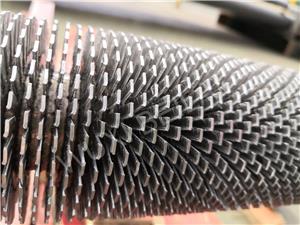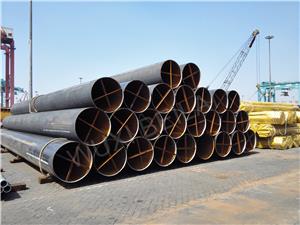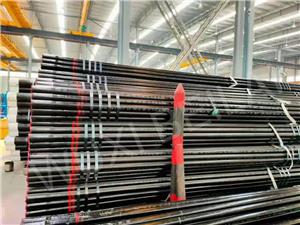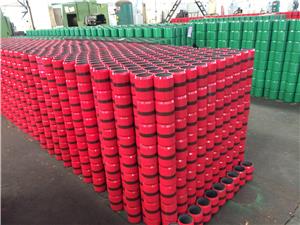Forging Strength: Alloy Steel Pipe Heat Treatment Explained by BEILAI Group
Forging Strength: Alloy Steel Pipe Heat Treatment Explained by BEILAI Group
BEILAI Group, a leading supplier of high-performance alloy steel pipe, recognizes that the true strength of an alloy pipe lies not only in its composition but also in its heat treatment. Understanding alloy steel pipe heat treatment is essential for industries demanding enhanced durability, strength, and metallurgical reliability. In this article, BEILAI explores the core processes, standards, and benefits of heat treating alloy steel pipes.
What Is Alloy Steel Pipe Heat Treatment?
Alloy steel pipe heat treatment refers to a controlled process of heating and cooling metal to alter its physical and mechanical properties without changing its shape. This treatment enhances the pipe’s hardness, strength, ductility, toughness, and resistance to wear and corrosion. For alloy steel pipe products, this is a vital step to ensure their suitability for high-stress and high-temperature applications.
Why Heat Treat Alloy Steel Pipe?
The purpose of alloy steel pipe heat treatment includes:
Relieving internal stresses from forming or welding
Improving hardness and tensile strength
Enhancing ductility for improved fabrication
Achieving microstructural uniformity
Increasing resistance to corrosion and oxidation
Common Heat Treatment Methods for Alloy Steel Pipe
1. Annealing
This process involves heating the alloy steel pipe to a specific temperature and then cooling it slowly. Annealing softens the pipe material, making it easier to cut, bend, and machine. It also refines grain structure and improves toughness.
2. Normalizing
Alloy steel pipe heat treatment through normalizing involves heating the pipe above its critical temperature, then air cooling. This method produces a more uniform grain structure and restores ductility lost during previous processing.
3. Quenching
Quenching rapidly cools the heated pipe in water, oil, or air. It increases the hardness and strength of the alloy steel pipe, though it may reduce ductility and cause internal stress if not followed by tempering.
4. Tempering
Tempering is performed after quenching to reduce brittleness while maintaining hardness. It involves reheating the quenched pipe to a lower temperature and holding it for a set time before cooling. This balances strength and flexibility.
5. Stress Relieving
This low-temperature heat treatment relieves residual stresses caused by welding, machining, or cold forming. It's essential for pressure-containing alloy steel pipe components to prevent failure in service.
Alloy Grades and Heat Treatment Compatibility
Different alloy steel grades require specific alloy steel pipe heat treatment methods. Common alloy grades include:
ASTM A335 P11, P22 (used in high-temperature applications)
ASTM A213 T11, T22 (boiler tubes)
ASTM A519 4130, 4140 (mechanical tubing)
BEILAI ensures that each alloy steel pipe undergoes the appropriate heat treatment process in line with international standards like ASTM, ASME, and API.
Benefits of Proper Alloy Steel Pipe Heat Treatment
Enhanced fatigue resistance and mechanical performance
Increased lifespan under cyclic loading and high-pressure environments
Improved resistance to corrosion, wear, and oxidation
Greater structural consistency and microstructure uniformity
Optimized machinability and weldability
Applications of Heat Treated Alloy Steel Pipe
Heat-treated alloy steel pipe is used in a wide variety of demanding applications:
Power generation (superheaters, reheaters, steam lines)
Oil and gas transmission lines
Petrochemical and chemical processing
Pressure vessels and reactors
Aerospace and military structures
BEILAI Group’s Expertise in Alloy Steel Pipe Heat Treatment
BEILAI Group operates advanced heat treatment facilities with controlled atmospheres and automated temperature monitoring. Our technical team ensures each alloy steel pipe receives the correct thermal treatment tailored to its grade and application. We offer:
In-house heat treatment for full traceability
Mechanical testing and microstructure analysis
Third-party inspection and certifications
Custom heat treatment schedules on request
Quality Standards and Compliance
All BEILAI alloy steel pipe products and heat treatment processes comply with global standards, including:
ASTM A335, A213, A519
ASME SA335, SA213
API 5CT, 5L
ISO 9001 and PED certification
Conclusion
Proper alloy steel pipe heat treatment is a cornerstone of high-performance piping systems. At BEILAI Group, we integrate precision engineering, metallurgy expertise, and state-of-the-art technology to deliver superior alloy steel pipe products. Whether you require pipes for high-pressure steam lines or extreme temperature chemical plants, our heat-treated alloy solutions are engineered to perform and built to last.
BEILAI Group — Forging Reliability Through Heat Treatment Excellence.




